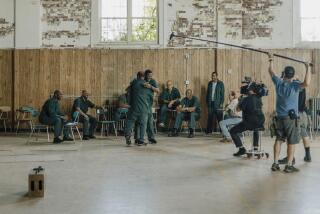Irving Koslowe; Prison Chaplain
- Share via
Rabbi Irving Koslowe liked to joke that he had an unusual congregation: one that “doesn’t mind losing members.”
For 49 years, he was the Jewish chaplain of New York’s Sing Sing prison, where he witnessed 17 executions, including those of Julius and Ethel Rosenberg.
Koslowe died Wednesday in New York after a short illness. He was 80.
He went to Ossining, the infamous prison up the river, in 1950 because he needed the work: He was a Yeshiva University graduate with a young family to feed and clothe.
Sing Sing, the formal name of the prison until 1970, had about 140 Jewish inmates in the general population when the rabbi arrived. There were Jews in the Death House too: eleven of the 19 prisoners facing the electric chair.
They had no place of their own to worship, but Koslowe eventually changed that. By 1959 he had convinced prison authorities to let him have a storage room, which he furnished with grungy red vinyl theater seats and lighted with a naked bulb.
The new synagogue was called Beit Shalom V’Tikvah, the room of “peace and hope.” He often told his congregants to “thank the Almighty” for that room, the one place where they were spiritually free.
He also talked about the Bible, Jewish history and law, observing Jewish holidays and asking God for forgiveness--the same things he discussed with his congregants on the outside.
He brought latkes for Hanukkah and blintzes for Shavuot. Later, the New York prison system served kosher food to its observant Jewish inmates, a change credited in part to Koslowe.
Of the 17 prisoners he walked to the death chamber, the most notorious were the Rosenbergs, who had been convicted of conspiracy to pass atomic secrets to the Soviet Union.
He never spoke of his feelings about the guilt or innocence of any of the 17 who were condemned to death, but he remembered every one.
He would face the person about to die and recite a prayer, usually standing only a foot away from the electric chair. In the moments before the switch was thrown, he would assure the prisoner: “I’ll be right by you.”
Although most of the executions took place at 11 p.m. Thursdays, the Rosenbergs were taken to the electric chair on a Friday: June 19, 1953.
That afternoon, after they were dead, he returned home heavy with the realization that the Rosenbergs had left behind two orphans: their 7- and 8-year-old sons. Awaiting him was his own 7-year-old son, who was brimming with excitement about a birthday celebration and Friday night worship services. “My feelings,” Rabbi Koslowe recalled last year, “were very hard to control.”
He also was rabbi of Mamaroneck’s Westchester Jewish Center for 44 years, taught criminal justice at New York’s Mercy College and was a trouble-shooting chaplain for prisons around the state.
More to Read
Sign up for Essential California
The most important California stories and recommendations in your inbox every morning.
You may occasionally receive promotional content from the Los Angeles Times.














